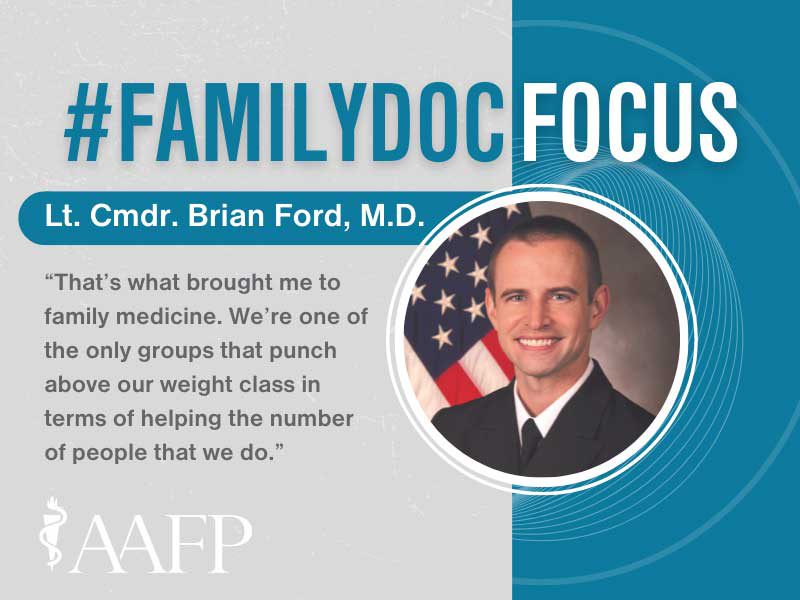Doctor-Patient Relationships Anchor Navy FP
June 8, 2022, 2:02 p.m. David Mitchell — Lt. Cmdr. Brian Ford, M.D., studied economics and neuroscience as an undergraduate at Tulane University because he wanted to better understand the choices people make. After one year at Georgetown University School of Medicine, Ford made a “ruthlessly fiscal decision” of his own when he decided to join the U.S. Navy.

“I had taken out, like, $55,000 dollars in loans, and that just was not sustainable,” said Ford, now an assistant professor of family medicine at the Uniformed Services University of the Health Sciences in Bethesda, Md.
Although his service commitment was based on economics, he has no regrets about a career path that has taken him across the Pacific Ocean and back multiple times.
“I really like the notion of service to people who I think are so directly serving me,” he said. “The people who take care of my country are the people whose families I get to take care of, so I do perceive that as a repayment of a debt or a service that I can contribute. Keeping members of the military at their highest physical capacity is in all of our best interests. I’ve been blessed with jobs that have made that a really enjoyable thing to do.”
Ford spent his final year in training as chief resident at Naval Hospital Camp Pendleton in California before spending a year as a staff physician at U.S. Naval Hospital Guam and another year as that hospital’s head of family medicine.
On Guam, where military installations cover roughly one-third of the island, Ford saw patients in the family medicine clinic as well as in the hospital, doing full-scope family medicine, including maternity care.
He also learned a lot about leadership and himself.
“To be perfectly candid, I learned that I wasn’t the type of leader that I want to be,” he said. “It was a very formative time because I learned that I have tendencies that are not always positive in leading people.
“As a chief resident, you lead other physicians, and I felt pretty comfortable doing that. But as a department head, I was leading other physicians, working with other departments, leading enlisted personnel and had responsibility for hiring and firing civilians. I was not really ready to do that then, but after that experience, I felt a lot more confident doing things like that.”
Ford had more opportunities to enhance his leadership skills, serving as a staff family physician and lead for mobile medical services during Pacific Partnership 2018. The annual deployment by the U.S. Navy’s Pacific Fleet is a multinational humanitarian assistance and disaster relief preparedness mission conducted in the Indo-Pacific. The Navy works with counterparts from the host countries and regional partners to provide medical, dental and veterinary care.
Ford made stops on Yap, an island in the Federated States of Micronesia, as well as on Palau and Malaysia.
“We worked kind of side by side next to local physicians and clinicians,” he said, “working on building local capacity in terms of things like trauma care, health systems, CPR, basic life support and advanced life support.”
Ford also was a planner for Pacific Partnership 2020. Preparations for that mission took him to Fiji, the Solomon Islands and Indonesia before the actual event was canceled because of the pandemic. Ford said the two experiences taught him a lot about what primary care looks like and what resources are available in other countries.
“The biggest takeaway that I have is that the doctor-patient relationship doesn’t really change much across cultures,” he said. “You can still be there for somebody even if you don’t speak the same language and even if your cultures don’t align very closely. The physician who is from there and native to there is always going to have a different level of understanding of their patients, but there is a universality to being able to reach across cultures and help. I think that is a really cool thing about our job.”
Since 2020, Ford has been faculty at the Uniformed Services University of the Health Sciences. This month he will complete a faculty development fellowship through the University of North Carolina.
It’s no surprise to Ford that he ended up in education. He taught SAT prep classes in college and Medical College Admission Test prep classes in medical school.
“I like the connection between a learner and a teacher,” said Ford, who will be a featured speaker during the National Conference of Family Medicine Residents and Medical Students, which is scheduled for July 28-30 in Kansas City, Mo. “It’s a very sustaining relationship, very comparable to the way that a doctor-patient relationship can be sustaining. I find a lot of joy in helping somebody in a significant way. Being a teacher is a natural extension of being a family physician.”
Ford said he tries to impress upon his students the sweeping scope of family medicine, the level of expertise that family physicians bring to clinical care and the importance of the doctor-patient relationship in family medicine.
His own specialty choice was based, in part, on his love of numbers.
“I’ve always thought about, ‘How can my time help the most people and be the most efficient?’” said Ford, whose wife, Caitlin Ford, D.O., is also a military family physician and educator. “That’s what brought me to family medicine. We’re one of the only groups that punch above our weight class in terms of helping the number of people that we do.
“If I wasn’t a physician, I think I probably would have been a health economist. But the doctor-patient relationship is kind of what sustains me. So, I think I might have been a little unhappy doing spreadsheets all day.”